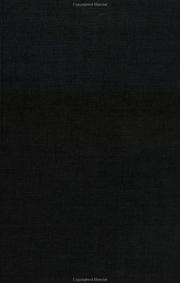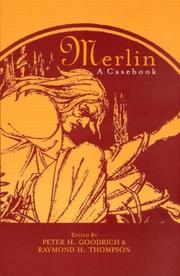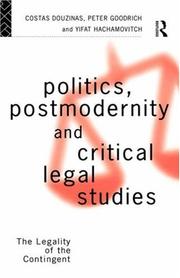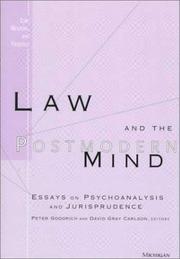| Listing 1 - 10 of 12 | << page >> |
Sort by
|

ISBN: 1134925794 0203316177 1280108401 0203413326 9780203413326 9780203316177 0415061652 0415865379 9780415865371 9781134925742 9781134925780 9781134925797 9780415061650 1134925786 Year: 1996 Publisher: London ; New York : Routledge,
Abstract | Keywords | Export | Availability | Bookmark
 Loading...
Loading...Choose an application
- Reference Manager
- EndNote
- RefWorks (Direct export to RefWorks)
In the wake of current criticisms of the legal profession, Peter Goodrich presents us with a radical alternative vision of the law. He examines past legal systems offering up the possibility of a more humane system.
Law --- Jurisprudence. --- Courts of love. --- Critical legal studies. --- Law and literature. --- Literature and law --- Literature --- Critical legal studies movement --- Critical theory --- Sociological jurisprudence --- Cours d'amour --- Love, Courts of --- Courts and courtiers --- Chivalry --- Courtly love --- Legal history --- History. --- Philosophy --- History and criticism
Book
ISBN: 1107502381 1139891642 1107500982 1107506395 1107516781 110749687X 110750368X 1139565788 9781107516786 9781139565783 9781461950998 1461950996 9781107035997 1107035996 9781107546103 1107546109 Year: 2014 Publisher: Cambridge : Cambridge University Press,
Abstract | Keywords | Export | Availability | Bookmark
 Loading...
Loading...Choose an application
- Reference Manager
- EndNote
- RefWorks (Direct export to RefWorks)
The emblem book was invented by the humanist lawyer Andrea Alciato in 1531. The preponderance of juridical and normative themes, of images of rule and infraction, of obedience and error in the emblem books is critical to their purpose and interest. This book outlines the history of the emblem tradition as a juridical genre, along with the concept of, and training in, obiter depicta, in things seen along the way to judgment. It argues that these books depict norms and abuses in classically derived forms that become the visual standards of governance. Despite the plethora of vivid figures and virtual symbols that define and transmit law, contemporary lawyers are not trained in the critical apprehension of the visible. This book is the first to reconstruct the history of the emblem tradition, evidencing the extent to which a gallery of images of law already exists and structuring how the public realm is displayed, made present and viewed.
Symbolism in law. --- Emblem books. --- Law and art. --- Devices (Heraldry) --- Emblems. --- Illustrated books --- Legal symbolism --- Symbolism, Legal --- Law --- Heraldry --- Signs and symbols --- Symbolism --- Arms, Coats of --- Coats of arms --- Devices --- Heraldic devices --- Printers' marks --- Art --- Art and law --- Collectors and collecting --- Law and legislation --- Iconography --- History of civilization --- emblem books --- symbols --- emblems [allegorical pictures] --- anno 1500-1599 --- anno 1600-1699 --- General and Others
Book
ISBN: 1474453716 1474426581 147442659X 9781474426589 9781474453714 9781474426565 1474426565 9781474426596 1474426573 Year: 2018 Publisher: Edinburgh : Edinburgh University Press,
Abstract | Keywords | Export | Availability | Bookmark
 Loading...
Loading...Choose an application
- Reference Manager
- EndNote
- RefWorks (Direct export to RefWorks)
Peter Goodrich looks beyond Judge Schreber's mental health to evaluate his jurisprudential theory. Goodrich analyses Schreber's Memoirs, interpreters and intellectual context to show how Schreber challenges the legal thought of his era and opens up a potentially vital approach to contemporary jurisprudence.
Jurisprudence --- Law --- Philosophy. --- Philosophy --- Schreber, Daniel Paul, --- Schreber, Paul, --- Judges --- Alcaldes --- Cadis --- Chief justices --- Chief magistrates --- Justices --- Magistrates --- Courts --- Legal status, laws, etc. --- Officials and employees --- Denkwürdigkeiten eines Nervenkranken (Schreber, Daniel Paul) --- Germany. --- Memoirs of my nervous illness (Schreber, Daniel Paul) --- Alemania --- Ashkenaz --- BRD --- Bu̇gd Naĭramdakh German Uls --- Bundesrepublik Deutschland --- Deutsches Reich --- Deutschland --- Doitsu --- Doitsu Renpō Kyōwakoku --- Federal Republic of Germany --- Federalʹna Respublika Nimechchyny --- FRN --- German Uls --- Germania --- Germanii︠a︡ --- Germanyah --- Gjermani --- Grossdeutsches Reich --- Jirmānīya --- KhBNGU --- Kholboony Bu̇gd Naĭramdakh German Uls --- Nimechchyna --- Repoblika Federalin'i Alemana --- República de Alemania --- República Federal de Alemania --- Republika Federal Alemmana --- Vācijā --- Veĭmarskai︠a︡ Respublika --- Weimar Republic --- Weimarer Republik --- Germany (East) --- BuÌgd NaiÌramdakh German Uls --- Deguo --- Doitsu RenpoÌ KyoÌwakoku --- Federalʹna Respublika Nimechchyny --- GeÌrman --- Germaniiï¸ a︡ --- JirmaÌniÌya --- Kholboony BuÌgd NaiÌramdakh German Uls --- RepuÌblica de Alemania --- RepuÌblica Federal de Alemania --- VaÌcijaÌ --- VeiÌmarskaiï¸ a︡ Respublika --- Germany (West) --- Europe --- Gėrman
Book
ISBN: 9004354344 9789004354340 9789004354333 9004354336 Year: 2017 Publisher: Leiden : Brill,
Abstract | Keywords | Export | Availability | Bookmark
 Loading...
Loading...Choose an application
- Reference Manager
- EndNote
- RefWorks (Direct export to RefWorks)
Taking as its exemplum the use of images in judicial decisions, this article argues that the ratio decidendi of legal precedent should be supplemented with the imago decidendi , the figure or depiction that motivates judgment. Drawing upon the history of legal humanism, and particularly the tradition of juristic emblems, it is argued that an adequate understanding of case law rules and decisions requires attention to the imagery that conceives and propels the reasoned deliberation that follows. To adequately apprehend the transmission of law in a digital age requires acknowledging that images think differently, that the ambulation of the eye in the image is very different to the linear glance of the text.
Law and art. --- Copyright --- Copyright. --- Art --- Art and law --- Literary property --- Property, Literary --- Intangible property --- Intellectual property --- Anti-copyright movement --- Authors and publishers --- Book registration, National --- Patent laws and legislation --- Law and art --- Art. --- Collectors and collecting --- Law and legislation

ISBN: 1135583390 0415763657 1135583404 1280058730 0203503066 9780203503065 9780815306580 081530658X 9786610058730 6610058733 081530658X 9780415763653 9781135583408 9781280058738 9781135583354 9781135583392 0203610903 Year: 2003 Publisher: New York : Routledge,
Abstract | Keywords | Export | Availability | Bookmark
 Loading...
Loading...Choose an application
- Reference Manager
- EndNote
- RefWorks (Direct export to RefWorks)
This book deals with all aspects of the Merlin legend, from its origins to its expression in medieval and modern literature, film, and popular culture. Two of the reprinted essays are translated into English for the first time.
Arthurian romances --- Wizards in literature. --- History and criticism. --- Merlin --- Marzhin --- Meardon --- Merlí --- Merlijn --- Merlijn Ambrosius --- Merlim --- Merlin Ambrosius --- Merlino --- Merlino Ambrosio --- Merlin Caledonensis --- Merlin l'Enchanteur --- Merlins --- Merlinus --- Merlyn --- Merzhin --- Myrddin --- Myrddin Emrys --- In literature. --- Merlin (Legendary character) in literature. --- Merlin (Legendary character)
Book
ISBN: 9781487539818 1487539819 1487539827 Year: 2022 Publisher: Toronto, Ontario : University of Toronto Press,
Abstract | Keywords | Export | Availability | Bookmark
 Loading...
Loading...Choose an application
- Reference Manager
- EndNote
- RefWorks (Direct export to RefWorks)
"Laws of Transgression offers multiple perspectives on the story of Daniel Paul Schreber (1842-1911), a Chamber President of the German Supreme Court who was confined to a mental asylum after claiming God had communicated with him, desiring to make him into a woman. Schreber was not only a successful judge, but was also to become the author of one of the most commented upon texts in psychiatric literature, Memoirs of My Nervous Illness. Published in 1903, this remarkable work documented Schreber's visions, desires, jurisprudence and theology. Far from ending the Judge's legal investments, however, it manifested an intensification of engagement with the law in the attempt to prove that becoming a woman did not deprive the judge of legal competence. Schreber's experience of bodily change and his account of interior life has been the subject of over a century of psychoanalytic and medical scrutiny. With the contemporary trans turn, interest in the Judge's desire to become a woman has intensified. In Laws of Transgression, Peter Goodrich, Katrin Trüstedt, and their contributing authors set out to unfold Schreber's complex relation to the law. The collection revisits and rediscovers the Memoirs, not only in its juridical and political implications, but as a transitional and transgressional text that has challenged law and heteronormativity."--
Judges --- Jurisprudence --- Law --- Schreber, Daniel Paul, --- Denkwürdigkeiten eines Nervenkranken (Schreber, Daniel Paul) --- Germany. --- Judge Schreber. --- clinic and critique. --- law and gender. --- law and psychoanalysis. --- psychotheology. --- queer legal theory. --- transgender. --- Judges. --- Jurisprudence.

ISBN: 1134883587 1280144874 0203976800 9780203976807 0415086515 9780415086516 9780415086523 0415086523 0415086523 9781134883585 9781280144875 9781134883530 9781134883578 1134883579 Year: 1994 Publisher: London ; New York : Routledge,
Abstract | Keywords | Export | Availability | Bookmark
 Loading...
Loading...Choose an application
- Reference Manager
- EndNote
- RefWorks (Direct export to RefWorks)
This timely and assured book provides a unique guide to critical legal studies which is one of the most exciting developments within contemporary jurisprudence. It is the first book to systematically apply a critical philosophy to the substance of common law. The book develops a coruscating and interdisciplinary overview of the politics and cultural significance of the institutions of the law.
Critical legal studies. --- Law --- Postmodernism. --- Post-modernism --- Postmodernism (Philosophy) --- Arts, Modern --- Avant-garde (Aesthetics) --- Modernism (Art) --- Philosophy, Modern --- Post-postmodernism --- Jurisprudence --- Critical legal studies movement --- Critical theory --- Sociological jurisprudence --- Philosophy. --- Law - Philosophy

ISBN: 1282462989 9786612462986 0472023101 9780472023103 0472108417 9781282462984 6612462981 9780472108411 Year: 1998 Publisher: Ann Arbor : University of Michigan Press,
Abstract | Keywords | Export | Availability | Bookmark
 Loading...
Loading...Choose an application
- Reference Manager
- EndNote
- RefWorks (Direct export to RefWorks)
Explores the connections between psychoanalysis and law.
Law --- Psychoanalysis. --- Psychology --- Psychology, Pathological --- Juridical psychology --- Juristic psychology --- Legal psychology --- Psychology, Juridical --- Psychology, Juristic --- Psychology, Legal --- Psychology, Applied --- Therapeutic jurisprudence --- Jurisprudence --- Philosophy. --- Psychological aspects. --- Psychoanalysis --- Philosophy --- Psychological aspects
Book

ISBN: 1474445845 9781474445849 9781474445825 1474445829 9781474445856 1474445853 Year: 2022 Publisher: Edinburgh : Edinburgh University Press,
Abstract | Keywords | Export | Availability | Bookmark
 Loading...
Loading...Choose an application
- Reference Manager
- EndNote
- RefWorks (Direct export to RefWorks)
Examines the complex and varied interactions between law and the different visual media produced by changing technologiesIn this volume, international specialists from new and established domains of law, media, film and virtual studies address the emergence of the jurist in the era of digital transmission. Examining the jurisprudence of new visual technologies – from the cinema of the early twentieth century to the social media of our own time – this volume explores the multiple intersections of these visual technologies and the law from the theoretical insight they generate to the nature of law to the impact they have on doctrinal development.Part One tracks the media, the technologies and apparatuses of modern law. It looks specifically at the acoustics of architecture, emblematic texts, films of trials, the prohibition of cameras in courtrooms and the rules of contempt, televised reporting of law, and the multiple fora and chat rooms of Facebook, vblogs, #hashtag law and the mobile-optimised web. Part Two examines the jurisprudential questions raised by new visual and virtual reality technologies of the 21st century. Will social media lead to social law? The force of legal remediation? Virtual courts and online judges? Paperless trials? Electronic discovery? All of these developments impact how we conceive of the practice of law.Key FeaturesIncludes an international range of contributions and coverage, from the United States and Europe to the Middle East and ChinaPresents a firm historical foundation for considering the connections between law and new forms of mediaIncludes a range of contributions from established scholars and promising new voices in the fieldExamines a wide range of new media, from online platforms to virtual realityContributorsMichele Castaneda, Brown UniversityEmanuele Coccia, EHSS ParisChristian Delage, Université Paris 8 & Director of IHTPClaire Demoulin, Université Paris 8 & IHTPDaniela Gandorfer, Princeton UniversityPeter Goodrich, Cardozo Law and NYU Abu DhabiThibaud Guichard, Université Paris 8Christopher Hutton, University of Hong KongWilliam MacNeil, Southern Cross UniversityAntoine Rocipon, Université Paris 8 & IHTPRaja Sakrani, University of BonnLaurent de Sutter, University of BrusselsMarco Wan, University of Hong Kong
Book

ISBN: 0823285928 0823283801 082328381X Year: 2019 Publisher: New York, NY : Fordham University Press,
Abstract | Keywords | Export | Availability | Bookmark
 Loading...
Loading...Choose an application
- Reference Manager
- EndNote
- RefWorks (Direct export to RefWorks)
Populism in politics and policy orientations in law have thrown the jurisdiction of the academy and the disciplines of interpretation into disarray. Critique flounders in abstraction and negativity, law loses itself in particularity. Administering Interpretation brings together philosophers, humanists, and jurists from both continental and Anglophone jurisdictions to reassess the status and trajectory of interpretative theory as applied in the art of law. Tracking the thread of philosophical influences upon the community of legal interpretation, the essays move from the translation and wake of Derrida to the work of Agamben, from deconstruction to oikononmia. Sharing roots in the philological excavation of the political theology of modern law, contributors assess the failure of secularism and the continuing theological borrowings of juridical interpretation. The book brings contemporary critique to bear upon the interpretative apparatuses of exclusion, the law of spectacular sovereignty, and the bodies that lie in its wake. Contributors: Giovanna Borradori, Marinos Diamantides, Allen Feldman, Stanley Fish, Pierre Legrand, Bernadette Meyler, Michel Rosenfeld, Bernhard Schlink, Jeanne Schroeder, Laurent de Sutter, Katrin Trüstedt, Marco Wan
Law --- Philosophy. --- Agamben, Giorgio, --- Derrida, Jacques --- Influence. --- Agamben. --- Derrida. --- critique. --- deconstruction. --- interpretation. --- oikonomia.
| Listing 1 - 10 of 12 | << page >> |
Sort by
|

 Search
Search Feedback
Feedback About UniCat
About UniCat  Help
Help News
News